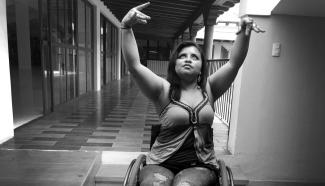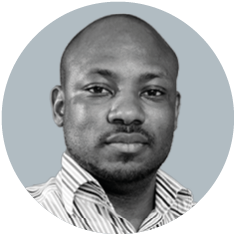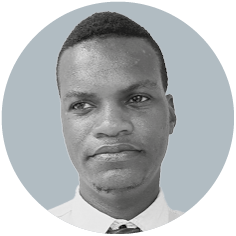Disability
Empowering women and changing minds

Laure Tay is the country director of Togo, Benin and the Côte d'Ivoire for Christoffel-Blindenmission (CBM), a German civil-society organisation. She has a good understanding of the situation of disabled women in the countries she is responsible for. Particularly problematic is the connection between poverty and disability: disability is often the cause, but also the result of poverty.
Tay reports that the affected women are confronted with many forms of violence. “There is direct and indirect violence, physical and psychological violence, which are inflicted by people in their surroundings, for instance by their caretakers. They also suffer because it is often not possible for them to earn an income or lead an independent life.” According to Tay, this happens in many countries, even in rich industrialised ones, but in Africa there are additional socio-cultural barriers: disability is frequently seen as a curse or a sign of witchcraft.
For that reason, disabled women often experience stigmatisation and exclusion in many areas, including education, health care, employment and family life. CBM wants to come to their aid precisely here with a human-rights-based approach, according to the country director: “We are primarily concerned with making women strong and empowering them to change their situation. They have to be made aware of their rights and claim them.” In her opinion, that is the only way to permanently change society's mindset.
CBM secured the support of Germany's Federal Ministry for Economic Cooperation and Development for a project in Togo that was initiated by a woman who has been affected by violence and disability. Along with a few women from her village, she began to establish herself an economic basis by manufacturing small items like soaps, salves and bags. Around 1000 women are now part of the enterprise. Their income has allowed them to make a living and send their children to school. According to its founder, the project succeeded in boosting the women's confidence and changing the attitudes of those in the surrounding area. Tay reported on the project at an online conference that was organised by CBM and representatives of Germany's federal government to address the needs of people with disabilities.
Similar problems worldwide
Disabled women in other parts of the world struggle with similar problems as women in West Africa, explains Abia Akram, the head of the National Forum for Women with Disabilities in Pakistan. She emphasises that coronavirus has exacerbated the situation; domestic violence in particular has become even more common. She regrets the fact that women often don't know where they can find help. During the pandemic, her organisation began equipping disabled women with better technology so they can access information on the internet and take advantage of digital opportunities.
Akram argues that a real social transformation must take place and that disabled women should be given a true stake in society and politics. According to her, policymakers also have to do their homework. She points out that while there are laws that guarantee the equal rights and opportunities of people with disabilities, they must also be implemented.
According to its managing director, Ingrid-Gabriela Hoven, the German Agency for International Cooperation (GIZ) is aware that disabled women have an increased risk of experiencing violence. Therefore, she says, GIZ has set itself the goal of integrating and heeding this knowledge in all of its programmes. In order to raise awareness among its own employees, the organisation is conducting trainings and has issued guidelines about how the topics of gender sensitivity and inclusion can be incorporated. Like many experts, Hoven bemoans the fact that it is very difficult to collect data because disability is often not reported.
Link
CBM photography exhibition Silent Tears – Starke Frauen (strong women):
https://www.cbm.de/unsere-politische-arbeit/silent-tears.html
Sabine Balk is a member of the editorial team of D+C Development and Cooperation / E+Z Entwicklung und Zusammenarbeit.
euz.editor@dandc.eu













